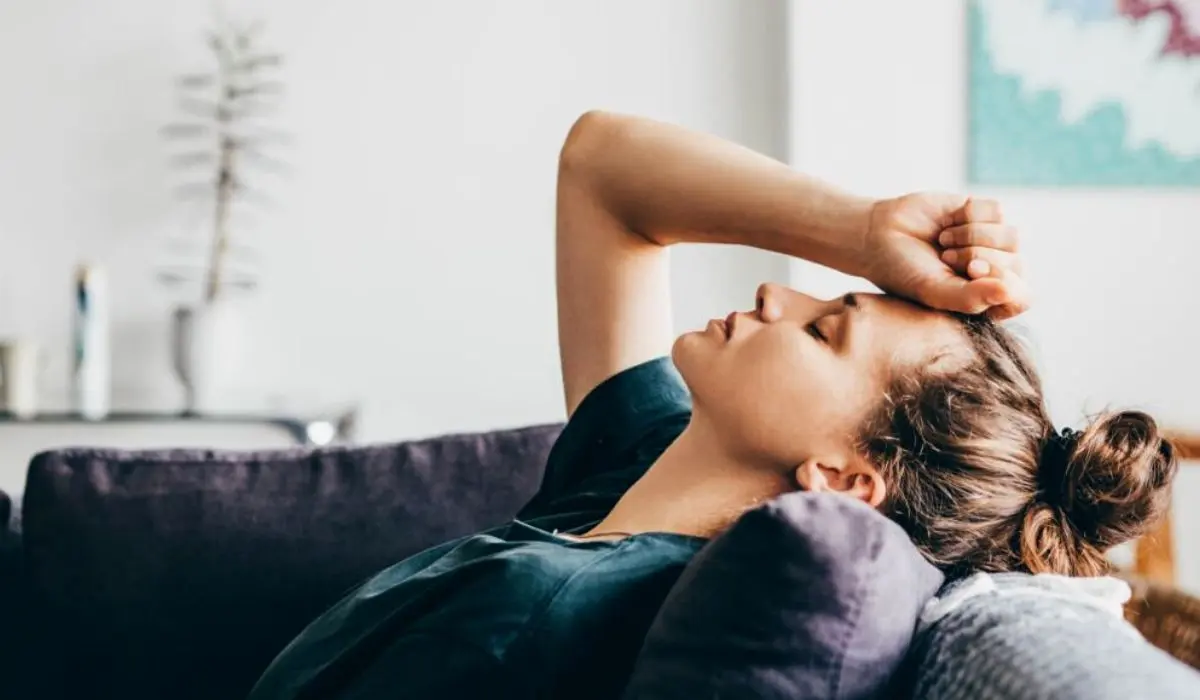Anxiety can be overwhelming. But, there are ways to take back control and reduce the impact it has on our lives. Here are some powerful techniques to help us conquer anxiety.
◼ Deep breathing exercises can be very beneficial. When we feel anxious, our breath becomes shallow and rapid, amplifying our stress levels.
◼ Challenging negative thoughts is also important. Anxiety often stems from irrational fears and catastrophic thinking patterns.
◼ Physical exercise is also essential to combat anxiety. It boosts endorphins, relieves muscle tension, and helps create better sleep.
◼ Creating a consistent sleep routine is also beneficial. Lack of sleep can increase feelings of irritability and make us more vulnerable to stressors.
Understanding Anxiety
Anxiety, a common human emotion, can be overwhelming and hard to understand.
It includes feelings of fear, worry, and unease which can interfere with daily life. To comprehend anxiety fully, one must dive into its depths and examine its various aspects.
Recognizing the physical symptoms of anxiety is important. These can vary from rapid heartbeats and shortness of breath to excessive sweating and trembling.
By noticing these signs, individuals can detect when anxiety strikes and take proactive steps to deal with it.

Emotional triggers also play a significant role – past experiences or traumatic events can increase feelings of unease and fear.
Moreover, comprehending the root causes of anxiety is key to managing it effectively.
Genetics, brain chemistry imbalances, and environmental stressors can all lead to anxiety disorders.
By identifying these triggers, individuals can work to reduce their effects on mental health.
◼ Deep Breathing Techniques
Deep breathing is an ancient, powerful tool to reduce stress and increase relaxation. Focus on your breath and let go of the tension. Here’s how to incorporate it into your daily routine:
- Find a comfy spot: Sit or lie down in a quiet place.
- Close your eyes: Block out visual stimuli to better focus.
- Take a deep inhale: Slowly inhale through your nose. Feel your abdomen expand.
- Exhale slowly: Release the air out of your mouth. Concentrate on the sensation of letting go.
- Repeat: Do this for at least 5-10 minutes. Experience the rhythm of your breath.
By practicing deep breathing often, you can respond to stressful situations with more calmness and clarity. It was an integral part of ancient yoga practices that aimed to link the mind and body.
◼ Exercise And Physical Activity
Exercise and physical activity can reduce anxiety. They provide many psychological and physical rewards that help control anxiety.
Here’s a 4-step guide for using exercise and physical activity to reduce anxiety:
- Start with light exercises: Take it easy with activities like a walk or stretching. These simple movements warm up your body and lower the risk of injury.
- Do aerobic exercises: Go swimming, running, or dancing. This raises your heart rate and gives you “feel-good” hormones, reducing stress and making you feel better.
- Strength-train: Lift weights or do bodyweight workouts. Improves fitness and boosts self-confidence, lowers anxiety symptoms.
- Mind-body exercises: Try yoga or tai chi. Combines physical movements and mental focus with relaxation. Promotes mindfulness, calms the mind, and gives a sense of well-being.
Plus, exercising outside lets in natural sunlight, which increases vitamin D levels. This vitamin helps regulate mood and can lower anxiety.
◼ Mindfulness And Meditation
Mindfulness and meditation are great for reducing anxiety. Focus on the present and watch your stress melt away. Here’s your guide:
- Find a quiet, comfy spot where you can sit or lie down with no distractions.
- Close your eyes and take a few deep breaths. Let go of tension and worry.
- Bring your attention to your breath. Notice each inhale and exhale. Don’t judge any thoughts that come up.
- Scan your body from top to bottom. Be aware of any tension or discomfort, then let it go.
- Tune in to the sounds, sensations, and thoughts around you. Accept them without trying to control them.
- Reflect on three things you are grateful for in this moment. Feel the positive emotions associated with gratitude.
Remember that mindfulness and meditation take practice. Regular sessions will help train your mind to stay present and reduce anxiety.
◼ Healthy Lifestyle Habits
To lessen anxiety, practice healthy lifestyle habits! Here’s a simple 3-step guide to get you started:
- Nutrition – Eat foods with vitamins, minerals, and antioxidants. Cut back on caffeine and sugar. Hydrate with lots of water.
- Exercise – Do physical activities you enjoy. Aim for 30 mins most days of the week. Exercise reduces stress and anxiety.
- Sleep – Create a sleep schedule with 7-9 hours of quality sleep each night. Have a bedtime routine. Make your sleeping environment comfortable.
Plus, try mindfulness practices like meditation or deep breathing.
◼ Seeking Support From Others
For coping with anxiety, look to others for assistance. Here are five key ideas:
- Talk to loved ones: Sharing your feelings with family or friends can give you comfort.
- Join a support group: Being part of a supportive community can help you understand what you’re going through and offer support.
- Talk to a therapist: Consulting a therapist or counselor can provide strategies to manage anxiety and personalized tools.
- Look into online forums: Participating in mental health forums can give you the chance to connect with those who have similar experiences.
- Speak to a healthcare provider: Discussing your anxiety with a healthcare professional can lead to resources and referrals.
It’s important to remember that seeking support means you don’t have to face anxiety alone.
Expressing worries, connecting with understanding people, and getting professional help is evidence of the strength and a step towards better mental health.
◼ Cognitive Behavioral Therapy (CBT)
Cognitive Behavioral Therapy (CBT) is a great way to reduce anxiety.
It focuses on changing negative thought patterns, which in turn can change emotions and behaviors. Here are 6 steps to implementing CBT:
- Recognize negative thoughts. Notice the negative thinking that contributes to your anxiety. Pay attention to your thinking patterns and spot any distorted or irrational thoughts.
- Challenge the thoughts. Doubt their accuracy and validity. Ask yourself if there is any evidence to back them up or if they are unfounded beliefs.
- Replace negative thoughts with positive ones. Counter the negative thoughts with more rational and positive thoughts. This can help shift your mindset and decrease anxiety.
- Practice relaxation techniques. Do deep breathing exercises, meditation, or progressive muscle relaxation daily. These techniques can help calm your mind and body when anxious.
- Face your fears gradually. Tackle situations that cause anxiety. Start with less challenging scenarios and slowly progress to more difficult ones. This can help you build resilience and lower anxiety levels.
- Maintain a positive outlook. Focus on your strengths and successes. Practice self-compassion and take part in activities that make you happy.
It’s also important to seek guidance from a trained therapist. They can provide insights, support, and guidance.
◼ Medication And Professional Help
Consult a healthcare professional to know if medication is needed for managing anxiety. Options such as SSRIs or benzodiazepines can ease symptoms.
Therapists or psychologists can provide valuable insight for management.
Cognitive-behavioral therapy (CBT) can help identify negative thoughts and develop coping mechanisms.
Adopt healthy lifestyle changes like regular exercise, relaxation techniques, a balanced diet, and sleep. Seek professional help tailored to your personal needs.
Conclusion
Anxiety can be tough to manage. But there are strategies that can help reduce its effects. By using these techniques, you can control your emotions and live a better life.
Mindfulness meditation is one way to manage anxiety. This technique involves focusing on the present without judgment or attachment to thoughts or feelings.
Related:- High-Fat Foods That Are Actually Healthy: Exceptionally Nutritious Fatty Foods!
It has been proven to lower anxiety and bring a feeling of calmness.
Regular exercise can also help. Physical activity releases endorphins, which boost mood. Doing 30 minutes of moderate exercise each day can reduce anxiety.
Social support is key in managing anxiety. Being with understanding of people who can provide emotional support can reduce stress.
It can be beneficial to talk to a professional or confide in family or friends. Having a strong support network is important for handling anxiety.

